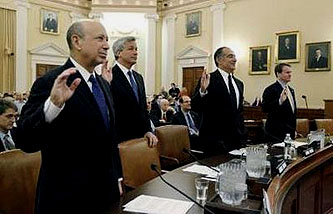 My first post this morning was a reflexive reaction to the paltriness of the proposed bank tax. But a bit of early-morning pissiness probably isn’t very convincing. So here’s James Kwak with a more considered reaction:
My first post this morning was a reflexive reaction to the paltriness of the proposed bank tax. But a bit of early-morning pissiness probably isn’t very convincing. So here’s James Kwak with a more considered reaction:
From Q4 2008 through Q2 2009, large banks had a funding cost that was 78 basis points1 lower than that of small banks….[So] the tax isn’t nearly big enough! It’s being calculated as 15 basis points of uninsured liabilities, calculated as assets minus Tier 1 capital minus insured deposits. 15 basis points is a lot less than 78 basis points. And if the FDIC cost of funds data are based on all liabilities (not just uninsured liabilities), then charging 15 basis points on uninsured liabilities only increases the overall cost of funds by about 7 basis points (at least in the administration’s example). This doesn’t come close to compensating for the TBTF subsidy.
The point of the tax shouldn’t simply be to pay back the cost of TARP, which is just a small part of what the government did to help out the banking sector in 2007-08. It should also be used to level the playing field. Big banks get funding at lower cost because they are, supposedly, safer than small banks. But guess what? That’s a mirage. They fail just like small banks, but they do so less often and get bailed out when it happens. So why give them an advantage that serves mainly to let them grow ever more gigantic? A properly designed tax — one that’s both bigger and more graduated, so that it goes up as banks get larger — would be a much better one. More here from Simon Johnson and Peter Boone.
1A basis point is a hundredth of a percent. So 78 basis points is 0.78%, which is quite a bit when you’re talking about loan books that amount to trillions of dollars.

















